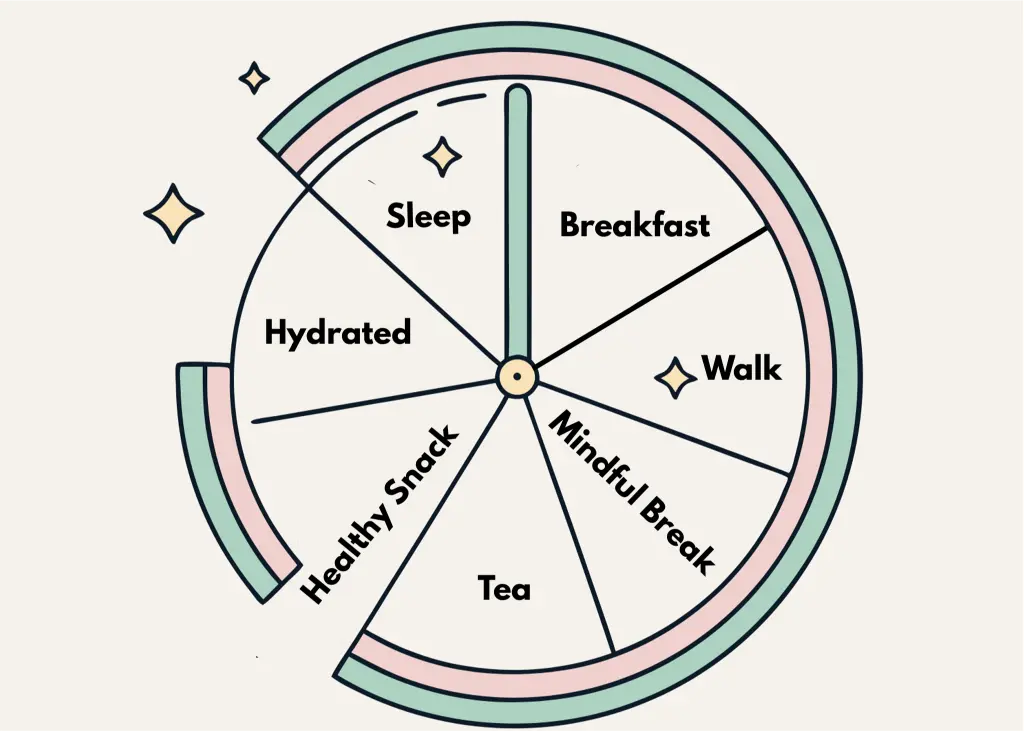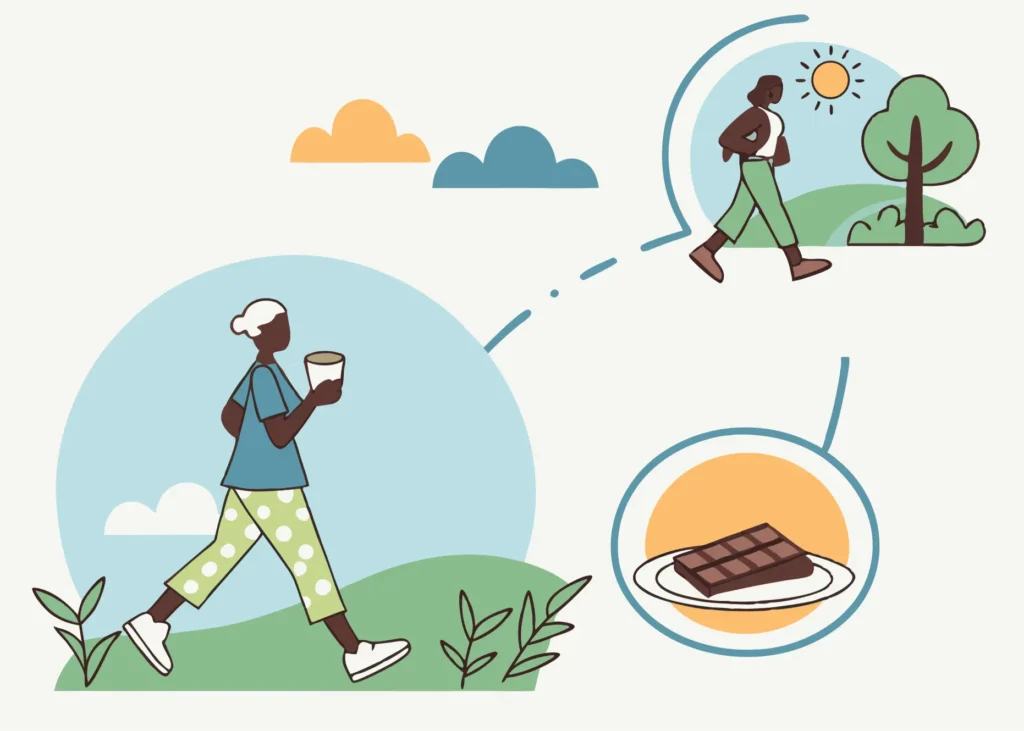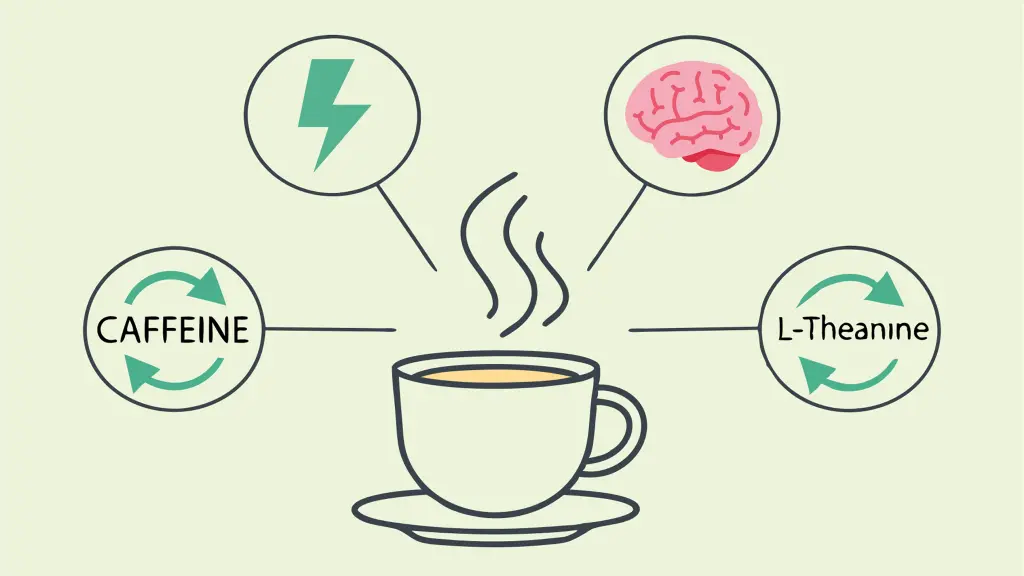Many people know this feeling all too well: you’re cruising through your day when suddenly you hit a wall. Your focus starts to slip, and your energy crashes right when you need it most. Instead of reaching for another cup of coffee or a candy bar (which often leads to an even bigger crash later), there are better ways to boost active energy naturally.
The secret lies in combining green tea, dark chocolate, and smart daily habits. These natural options give you steady energy without the ups and downs of artificial stimulants.
Why Natural Energy Sources Work Better
Real energy isn’t just about staying awake – it’s about keeping your focus sharp, staying productive, and maintaining a good mood all day long. Unlike sugary drinks or high-caffeine products that send you on an energy rollercoaster, natural sources give you a smoother, longer-lasting lift.
Green Tea: Your Gentle Energy Partner
How Green Tea Gives You Energy
Green tea is special because it contains both caffeine and something called L-theanine. The caffeine gives you a mild energy boost, while L-theanine helps you stay calm and focused. This combination creates what experts call “calm alertness” – you feel awake and sharp without the shakes.
The Science Behind a Green Tea Energy Boost
Research shows that green tea offers several benefits:
- Better Brain Function: Studies found that people who drink green tea regularly have a 64% lower chance of mental decline as they age
- Cell Protection: Green tea contains powerful antioxidants called catechins that protect your cells from damage
- Steady Energy: With about 30-50 mg of caffeine per cup (compared to coffee’s 95-200 mg), green tea provides a gentle lift that lasts
How to Use Green Tea for Energy Boost
- Morning: Start your day with a cup instead of jumping straight to coffee
- Afternoon: Sip some around 2-3 PM to avoid the post-lunch energy dip
- Daily Amount: Aim for 2-3 cups throughout the day for best results
Understanding your high energy morning routines can help you make the most of green tea’s benefits.
Does Dark Chocolate Boost Energy? The Sweet Truth
Yes, dark chocolate really can help with energy – but not in the way you might think. It’s not just a tasty treat; it’s actually packed with compounds that support both your brain and heart health.
How Dark Chocolate Works
Dark chocolate contains cocoa polyphenols, which are powerful antioxidants. Recent studies show that eating dark chocolate regularly can:
- Improve Blood Flow: The flavanols in dark chocolate help more blood reach your brain, which boosts focus and mental energy
- Lift Your Mood: Dark chocolate may increase levels of BDNF (brain-derived neurotrophic factor), a protein that improves mood and brain function
- Fight Fatigue: In clinical studies, people who ate dark chocolate daily reported feeling more energized and less tired
How Much Dark Chocolate Should You Eat?
- Amount: 1-2 small pieces (about 20g each) of high-quality dark chocolate (70% cocoa or higher) per day
- Perfect Pairing: Enjoy your dark chocolate with green tea for a double boost – you’ll get relaxation, alertness, and a mood lift all at once
If you’re curious about timing, you might want to read about whether you can eat chocolate before bed without affecting your sleep.

Daily Habits That Boost Active Energy
While green tea and dark chocolate are great helpers, your daily habits make the biggest difference in maintaining steady energy.
1. Stay Hydrated
Even mild dehydration can drain your energy and make it hard to focus. Start each day with a glass of water and keep sipping regularly to stay hydrated, and adding natural electrolytes for energy can give you an extra boost to keep going strong.
2. Eat a Good Breakfast
Skipping breakfast often leads to fatigue and stress. Choose foods that release energy slowly, like oatmeal or whole grains, to fuel your morning and prevent crashes. Knowing which foods naturally increase energy will help you make better breakfast choices.
3. Move Your Body Regularly
Physical activity, even in short bursts, gets your blood flowing and brings more oxygen to your body and brain. Try a quick walk, some stretching, or a few yoga poses to recharge, and find the best exercises that boost your energy.
4. Take Mindful Breaks
Short, intentional breaks can refresh your concentration and motivation. Step outside for some sunlight, practice deep breathing, or just pause to reset your mind, since sunlight has clear benefits for your energy levels.
5. Choose Smart Snacks
When you need a pick-me-up, go for snacks that combine protein and complex carbs. Try nut butter on whole-grain toast or fruit with nuts. These give you steady energy without the crash. Avoid foods that cause fatigue and instead focus on quick energy fixes that really work.
6. Get Quality Sleep
Good sleep is the foundation of all-day energy. Create a relaxing bedtime routine and stick to regular sleep times. If you’re struggling with sleep, looking into optimal sleep strategies or how green noise can improve rest might help. Also, Consider whether sleeping counts as fasting if you’re following an intermittent fasting routine.
7. Connect with Positive People
Spending time with upbeat friends, family, or coworkers can lift your mood and energy. Social connections are linked to better overall health and well-being.

Putting It All Together: A Sample Energy-Boosting Day
Here’s how you might use these strategies throughout a typical day:
Morning: Drink water, eat a balanced breakfast, and enjoy green tea instead of coffee
Mid-Morning: Take a short walk or stretch, and have a small piece of dark chocolate
Lunch: Focus on mindful eating – step away from your desk and enjoy your meal
Afternoon: Sip another cup of green tea and take a brief outdoor break
Late Afternoon: If you need a snack, try fruit with nuts and chat with a positive coworker
Evening: Wind down with a relaxing routine – read, stretch, or write down three things you’re grateful for
Addressing Common Energy Problems
If you’re facing specific energy issues, here are some targeted topics to explore:
- Afternoon crashes: How to beat afternoon fatigue
- Still tired after sleeping: Reasons why you may feel tired even after 8 hours of sleep
- General fatigue: Explore basic fatigue management strategies
- Underlying health issues: Understand the connection between inflammation and fatigue or chronic pain and fatigue
You might also want to look into blood sugar and energy levels or foods to improve mitochondrial function for a deeper understanding of energy at the cellular level.

The Bottom Line
You don’t need artificial stimulants or energy drinks to feel alert and focused all day. By combining green tea and dark chocolate with healthy daily habits like staying hydrated, moving regularly, eating well, taking breaks, and getting good sleep, you can boost active energy naturally.
The key is to start small. Pick one or two new habits and gradually build from there. Your body and mind will thank you for choosing natural, sustainable energy over quick fixes that lead to crashes.
Remember, if you’re considering energy drinks, weigh the boost energy drink benefits and risks before making them part of your routine. Natural alternatives like those mentioned here are often safer and more effective in the long run.
Understanding the causes of low energy can also help you address any underlying issues that might be draining your vitality.








